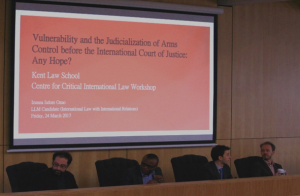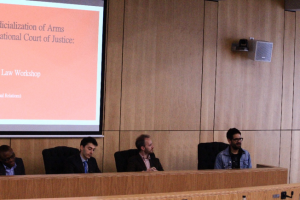 One of the highlights of this year’s Centre for Critical International Law (CeCIL) programme at Kent Law School was the graduate workshop which took place on Friday, 24 March 2017 at the new Wigoder law building. The workshop which captured the theme for 2016/17 academic session – ‘Vulnerability and Resilience’ witnessed presentations from PhD and LLM students. Notably, postgraduate students from the Brussels School of International Studies participated in the event for the first time. Professor Vasuki Nesiah of New York University who delivered the CeCIL annual lecture on 23 March 2017 was there to comment and provide feedback on the research papers by the students.
One of the highlights of this year’s Centre for Critical International Law (CeCIL) programme at Kent Law School was the graduate workshop which took place on Friday, 24 March 2017 at the new Wigoder law building. The workshop which captured the theme for 2016/17 academic session – ‘Vulnerability and Resilience’ witnessed presentations from PhD and LLM students. Notably, postgraduate students from the Brussels School of International Studies participated in the event for the first time. Professor Vasuki Nesiah of New York University who delivered the CeCIL annual lecture on 23 March 2017 was there to comment and provide feedback on the research papers by the students.
The first session was chaired by Dr Emily Haslam and it started off with the ‘Vulnerable Absent Subjects of International Law’ whereby the presenter, Faraz Khan made a case for an advanced recognition of water and animals in international law. For him, ‘water gives life’ to its immediate environs and should be protected at all cost. This incisive discourse on object-subject dialectic in international law was followed by the work of Dervashi Sen Deka which he titled ‘Understanding Vulnerability and Resilience from the lens of India’s Supreme Court.’ The paper engaged with the jurisprudence emanating from the apex court in India on the rights accruing to women, here seen as the most vulnerable in India, for violations and abuses suffered in the workplace and elsewhere. Interestingly, the Court, as the work noted, has gone ahead of the legislative arm of government to advance the protection of women by employing various international treaties and declarations. The last presentation brought another ingenious and penetrating dimension to the issue of water in international law. Here, Mia Tamarin tackled the political economy of water with the title ‘Vulnerability and Resilience in International Water Resource Sharing’.
Dr. Jastine Barrett headed the second session which commenced at 11:45am with a presentation by Liv Moe. In her work, Liv dealt with the strategic motivation behind violence against civilians in conflicts. The work noted the many theories for why rebel groups use violence against civilians and attempted to extend these theories to include the motivation for government violence in the context of the conflict in Sri Lanka. Hannah Gauss, the second presenter, took up a rather challenging task under International Humanitarian Law on the classification of the Syrian conflict and the weapons sanctioned by jus in bello. The paper opted for International Armed Conflict (IAC) and arrived at a considered position that war crimes and crimes against humanity are being committed in Syria. This paper was followed by the classic and impressive work of Benjamin Goh on ‘Between Law and Iconoclasm: The Al Mahdi Palindrome’. The research, adopting the methods peculiar to Law and Humanities scholars, offered a powerful critique of the 2016 decision of the International Criminal Court in the Prosecutor v Al Mahdi. The paper implicated the Court in the unbalanced and unsatisfactory narrative observable in criminal law jurisprudence, especially, when a guilty plea is made.
The last session had four presenters and was chaired by Dr. Luis Eslava. The first delivery came from Isdore Ozuo on the judicialization of arms control before the International Court of Justice. The paper examined the failure, or better still, the abdication of judicial responsibility on the part of the ICJ in arms control cases starting with the 1974 Nuclear Test cases to the decision in the Marshall Islands cases. The work, by noting the compromissory clause in the new Arms Trade Treaty, ended with a narrative of hope in the quest by states to involve the ICJ in arms regulation. This was followed by another interesting work on a contemporary issue by Roberto Scrivano. He examined the applicability of the law of war in cyber warfare and raised several legal questions surrounding cyber warfare. The third and last presentation came from Eric Loefflad and Peter Boyle respectively. Whilst Eric thoroughly engaged with the doctrine of effective control and why it matters under international law, Peter, on the other hand, advanced the course of NGOs in investor-state arbitration under the title ‘Supping with the devil- Could NGOs better further their objectives by using rather than protesting the investor-State Dispute Settlement mechanism?’ After much comments and feedback from the Kent Law School community, the workshop came to a close around 4 pm.
The CeCIL workshop was enriching in all ramification. First timers, like the present author, savoured the experience of presenting at a workshop and benefitted greatly from the responses and questions posed by the audience on their research. The joy of being listened to, coupled with the exchange of knowledge and ideas at the workshop left all participants happy and satisfied. Indeed, there was a quantum leap in our understanding of the theme of the workshop – vulnerability and resilience in particular, and the practice of international law in general. The posers and issues raised by the various research papers would continue to agitate the mind of all those present at the event. It was a great step for aspiring academics and a boost to the students especially those at the Masters level.
The very last remark came from Dr Luis when he said: ‘Thank you all for coming, see you next year.’ And the author wondered, who knows the theme that would be addressed by CeCIL next year? Who knows those that would be privileged to present their work then? As these thoughts linger, one thing is certain; CeCIL graduate workshop which started in 2015 has come to stay and it will continue to groom practitioners and academics in the field of international law.
Photo credits: H. Gauss

